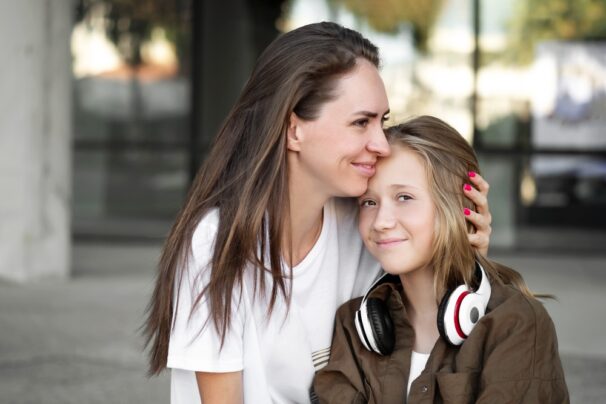Online Therapy for Children and Young People
Expert mental health therapy for children and teens
We understand how difficult it can be raising a child. Here at Onebright, we help make sure your child or teenager has access to expert professional therapy.
Onebright’s online therapy services for children and young people provide thorough clinical assessments and Cognitive Behavioural Therapy (CBT), Trauma Focused CBT (TFCBT), Interpersonal Psychotherapy (IPT) and Eye Movement Desensitisation and Reprocessing (EMDR) to help make sure every child, adolescent or young person in need has access to the best therapy possible.
Onebright can support your child with a range of mental health issues including anxiety, depression, social anxiety, panic attacks, obsessive compulsion disorder (OCD), separation anxiety and self harm.
Your child’s assessment will cost £100 (this includes consultation and report). After your assessment, if your child is recommended for therapy, this will cost £125 per appointment.

Cognitive Behavioural Therapy (CBT)
Interpersonal Psychotherapy (IPT)
Trauma-focused CBT
Eye Movement Desensitisation and Reprocessing (EMDR)
How do I get therapy for my child or teenager?
When choosing therapy for children and teenagers in the UK, you can either access it for free through the NHS or pay for it privately. Choosing private therapy can help your child get the support they need quickly by avoiding long waiting lists.
Therapy can be extremely beneficial, whether your child is struggling with anxiety, depression, childhood trauma, or a number of other mental health and wellbeing challenges.
When you choose child mental health therapy with Onebright, we take the time to understand more about the problems being faced, psychologically, emotionally and behaviourally and how these may be impacting your child at home and at school.
All our therapy assessments and sessions are carried out online. Learn what you can expect from our process below:
Get in touch with Onebright
Simply complete one of our contact forms. Or, if you’d like to talk through why you feel your child needs support, you can call us on 020 8129 0558. A member of our clinical liaison team will be able to answer any immediate questions you have.
We’ll then match you and your child with the right clinician for your child’s needs. We’ll set up a first appointment, at a time that works well for you and your child, and take your credit card details. This is to cover the cost of the first assessment session.
If you decide you want to continue with therapy for your child, you will be charged automatically, 48 hours before each therapy session begins.
Meet your therapist
At the end of your child’s initial assessment, the therapist will talk to you about a treatment plan for your child: how it will work, what to expect and how long it may take. They will identify the issues your child is struggling with and set some targets for getting to a positive end-point.
The treatment will be based on practice in Cognitive Behavioural Therapy (CBT) and/or Eye Movement Desensitisation Reprocessing (EMDR), Trauma Focused CBT (TFCBT) or Interpersonal Psychotherapy (IPT). Once you have a full picture of how the therapy sessions will work, you can decide if it’s for you and your child.
Agree an ideal plan
If your answer to therapy for your child is ‘yes’, we’ll organise a treatment schedule that’s designed for your child’s needs, at times that suit you and your child. If you and your therapist agree that CBT isn’t the right approach for your child, we’ll take the time to discuss why, and suggest an alternative.
How to talk to your child about therapy
Children and teenagers can find therapy daunting, and it might be a challenging discussion to have with them as a parent.
Here are some top tips for discussing therapy with your child or teenager:
- Talk about their feelings: Start a conversation with your child to find out how they are feeling and what their thoughts are about starting therapy. Make sure the conversation feels open, honest, and low-pressure.
- Have a positive attitude: When talking about therapy as an option, make sure you speak positively about it and offer reassurance.
- Normalise therapy: Offer reassurance that your child would not be alone in seeking support for a mental health or developmental condition. Show that you understand their hesitation, but highlight that going to therapy is common and normal.
- Don’t apply pressure: If your child remains unsure and nervous, give them some time and space to think about it on their own terms. Check in every few days to see how they are feeling about it now, and if they have changed their mind.
- Be flexible: Show flexibility in terms of offering remote therapy as an option, in case your child is nervous to meet with someone face-to-face. Reassure them that if their therapist doesn’t feel right for them, they can try another one.

Conditions our therapy can help with
Find out the common conditions we support children with below, or explore all conditions we help with.
How can children and teenagers benefit from therapy?
One of the key strengths of therapy for children and teenagers is its practical and hands-on approach.
For example, CBT teaches children and young people specific skills and strategies that they can then use in their daily lives to be able to better recognise and manage their difficult thoughts, feelings and behaviours. This approach helps to build self-confidence and encourages a sense of control over their mental health.
CBT can also be tailored to meet the unique needs of each child or young person. It can be adapted to suit different age groups, developmental stages and neurodevelopmental conditions (such as autism and/or ADHD). This can make it an ideal treatment option for people of all ages.
How to support your child or teen through therapy
Once your child has started therapy sessions, it is important to show up for them and support them through it.
You can show your support by:
- Being available to talk to your child whenever they need it, and making sure they know you are there for them.
- Offering to attend sessions with them or wait in the waiting room, if they feel nervous to attend on their own.
- Actively listening to what your child has to say about their thoughts and feelings, and showing interest and support for new coping strategies your child has learnt.
- Not taking it personally if your child finds it more difficult to open up to you as a parent than they do to their therapist.
- Showing resilience if your child doesn’t click with the first therapist they see, trying to find a new one that they get along with better.
Why choose Onebright?
Begin your journey
Your child must be aged 5-17 years to access our therapy services.
Your child’s assessment will cost £100 (this includes consultation and report).
After your assessment, if your child is recommended for therapy, this will cost £125 per appointment.
(all fields marked * are mandatory)
Frequently asked questions about therapy for children
It is an effective approach for common emotional problems that many young people face, such as stress, separation anxiety, anxiety disorders, depression, obsessive compulsive disorder, post-traumatic stress disorder, low self-esteem, addictions, pain, chronic fatigue, panic attacks, health anxiety and social anxiety.
If you wish to proceed, you will be immediately offered an online appointment with one of our experienced clinicians. To secure your assessment, payment for assessment and treatment is required when booking your child’s appointment, so please have your card details to hand.
If you are unable to attend, the child can attend with any other adult with parental responsibility.
If your child is unwell, please let us know as soon as possible. You can re-arrange or cancel the assessment. A charge may be payable for late cancellation or non-attendance. We operate a 48-hour working day cancellation policy.
Please call the Onebright Team on 020 8129 0558.
This information helps the clinician gain a holistic view of your child to help determine what would be best from a therapeutic perspective. It is common that children do not know this information so the parents involvement at this stage is paramount.
Whilst you may not need to be present for the whole appointment, it is important to remain close by to offer support during or afterwards.
We understand that it may be a big step to discuss problems and difficulties. Our aim is to ensure that both the child and parent feel comfortable, supported, and understood in the assessment.
We are committed to providing every person with the best mental healthcare, offering hope for a better and brighter future. Our services include assessments focused on common mental health conditions in children, and evidence-based therapies to treat conditions such as anxiety and depression.
At Onebright, we ensure our therapy is tailored to meet your child’s specific needs, making it an ideal treatment option for all ages, developmental stages, and neurodevelopmental conditions.
Sudden changes in behaviour
Changes to their sleep habits
Isolating themselves from friends and/or family
Changes to their appetite
If you have concerns about your child’s mental health, you can reach out to support services to see how they can help. Contact the Onebright client liaison team by calling 020 8129 0558 if you would like to talk through why you believe your child might need some extra mental health support.
If your child is in crisis, contact your GP for an emergency appointment, call 111, or visit your nearest Accident and Emergency.
There are many benefits to online therapy, including:
More flexibility for appointments
Improves accessibility to therapy services
Children and young people are familiar with digital communication
Reduces anxiety for some children who might worry about face-to-face meetings
Therapy sessions can be completed from a comfortable, familiar home environment
Joining sessions remotely from home rather than travelling to a clinic or office protects privacy and confidentiality



